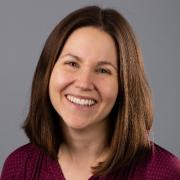
Paula Rauch '77, M.D., is the Founding Director of the Marjorie E. Korff Parenting At a Challenging Time (PACT) program. Dr. Rauch is a consultation child psychiatrist; she specializes in the impact of medical illness on families and on the emotional health and well-being of children. Rauch has practiced at The Massachusetts General Hospital (MGH) since 1982 and is an associate professor of psychiatry at Harvard Medical School. She is the inaugural incumbent of the Timothy Christopher Davidson Chair of Psychiatry at the MGH.
Rauch has been honored with numerous clinical and teaching awards, including the Kenneth B. Schwartz Compassionate Caregiver of the Year Award and the Simon Wile Leadership in Consultation Award from the American Academy of Child & Adolescent Psychiatry. She co-authored the books Raising an Emotionally Healthy Child When a Parent is Sick and Community Crises and Disasters: A Parent's Guide to Talking with Children of All Ages along with academic chapters and journal articles.
Rauch graduated from Amherst College and the University of Cincinnati College of Medicine. She completed her Psychiatry Residency at the MGH and her Child Psychiatry Fellowship at Cambridge Hospital. She is board certified in adult and in child and & adolescent psychiatry. She serves on the Science Advisory Board for the Military Child Education Coalition and as consultant to the PBS cartoon, Arthur. She is a trustee emerita at Amherst College.

Leary began her career as a clinical practitioner focused on improving access to diverse communities. Her early work on “negotiated transactions” in psychotherapy expanded to broader research on negotiation and conflict management. Leary’s global work includes studying “critical moments” in mediations to end armed conflict in Southeast Asia and researching social enterprise ventures in the Middle East. She teaches courses on leadership and conflict transformation, on advanced negotiation and mediation, and on physician-community engagement and the doctor-patient relationship.
For almost 12 years, she served as chief psychologist at the Cambridge Health Alliance, delivering culturally sensitive care and supporting the hospital’s primary care centers, specialty mental health and acute emergency services. This work included facilitating partnerships with community agencies, law enforcement and school systems, and assisting with the health system’s transformation into an accountable care organization.
At Amherst, she majored in psychology, graduated magna cum laude and was a member of the Sigma Xi honor society. She is currently a trustee at Amherst College.

McQuade’s courses cover topics of psychopathology and psychological research. In McQuade’s Abnormal Psychology course, students learn about the symptom presentations, theories of etiology, and treatments of major psychological disorders. McQuade also teaches an in-depth seminar on Child and Adolescent Clinical Psychology, which focuses on the clinical presentation of disorders during childhood and emphasizes the importance of developmental changes and the connection between theory, empirical research, and case examples. In McQuade’s Statistics course, students learn how to use statistics to answer and interpret research questions, providing them with a foundational knowledge of statistics that can enable them to critically evaluate scientific claims and to answer their own research questions. McQuade’s Introduction to Psychology course provides students with an introduction to the science of psychology and of how we understand the mind and behavior.
McQuade’s research investigates the complex interplay of cognitive, biological, and environmental processes that influence the social-emotional functioning of children and adolescents. McQuade’s work seeks to understand how a child’s own internal vulnerabilities interact with their environment to set the stage for these challenges, and how these internal vulnerabilities may then be influenced by the environment, such as experiences of peer victimization and parenting behaviors. McQuade’s work is strongly influenced by a developmental psychopathology perspective, acknowledging that clear distinctions between “normal” and “abnormal” behavior do not exist and that there is multifinality and equifinality in risk factors.